Key Auditing Terms and Audit Quality: ACC30010 Assignment
VerifiedAdded on 2023/06/09
|6
|1508
|244
Report
AI Summary
This report, prepared for a graduate placement at WPC, a large Accounting and Auditing firm, addresses key auditing terms and their relationship with audit quality. The report defines and discusses professional skepticism, earnings management, and discretionary accruals. Professional skepticism is presented as a crucial attitude for auditors, emphasizing its role in identifying and responding to misstatements. Earnings management is explained as decisions in financial reporting that can be either legal or misleading, with a focus on how it influences stakeholders. Discretionary accruals are defined as non-mandatory accounting entries and the report highlights their potential for manipulation. The report references academic sources to support its arguments and underscores the importance of these concepts in ensuring high-quality auditing practices and reliable financial reporting. The report is an email response to a senior manager outlining the research conducted on the key audit terms.
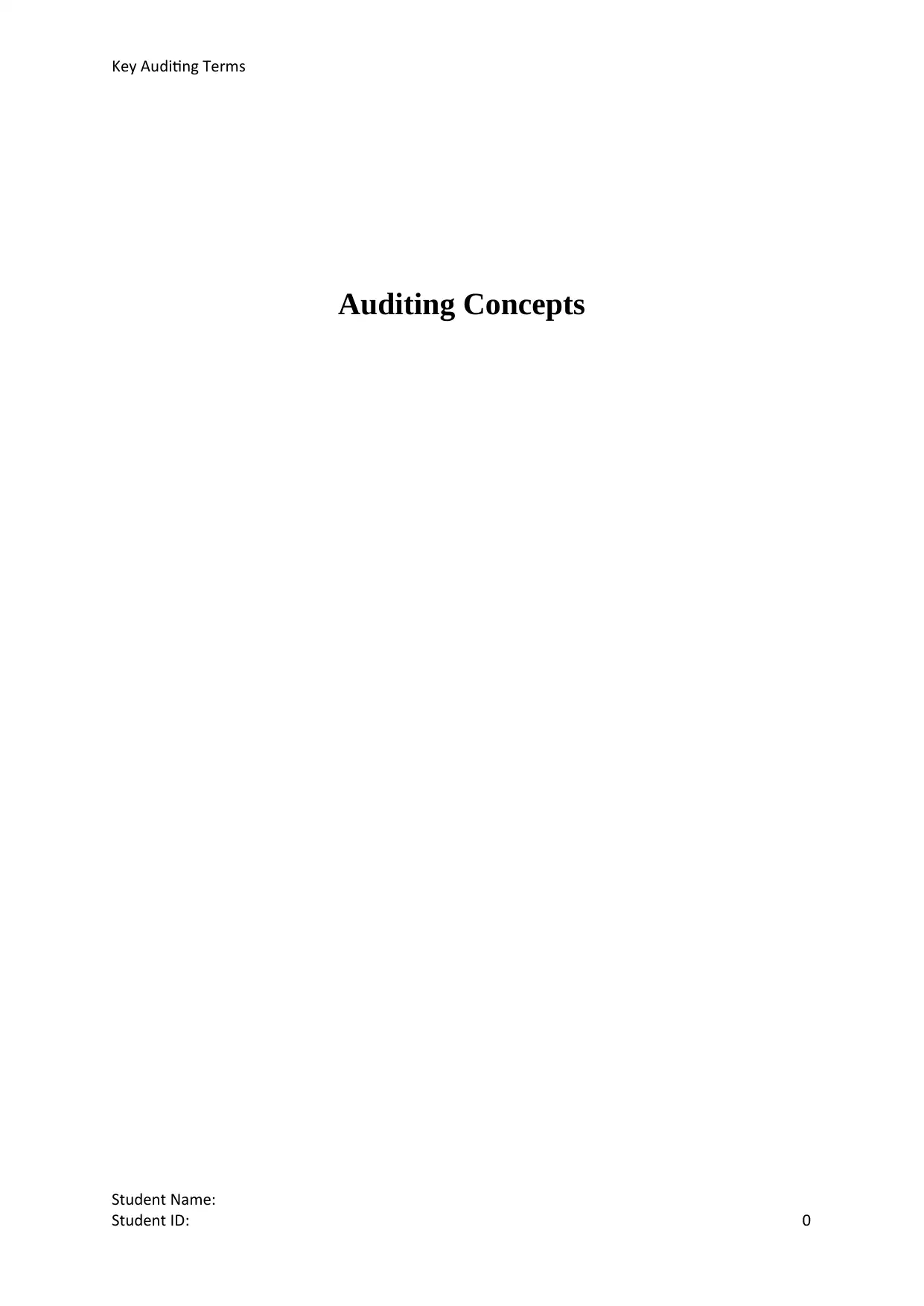
Key Auditing Terms
Auditing Concepts
Student Name:
Student ID: 0
Auditing Concepts
Student Name:
Student ID: 0
Paraphrase This Document
Need a fresh take? Get an instant paraphrase of this document with our AI Paraphraser
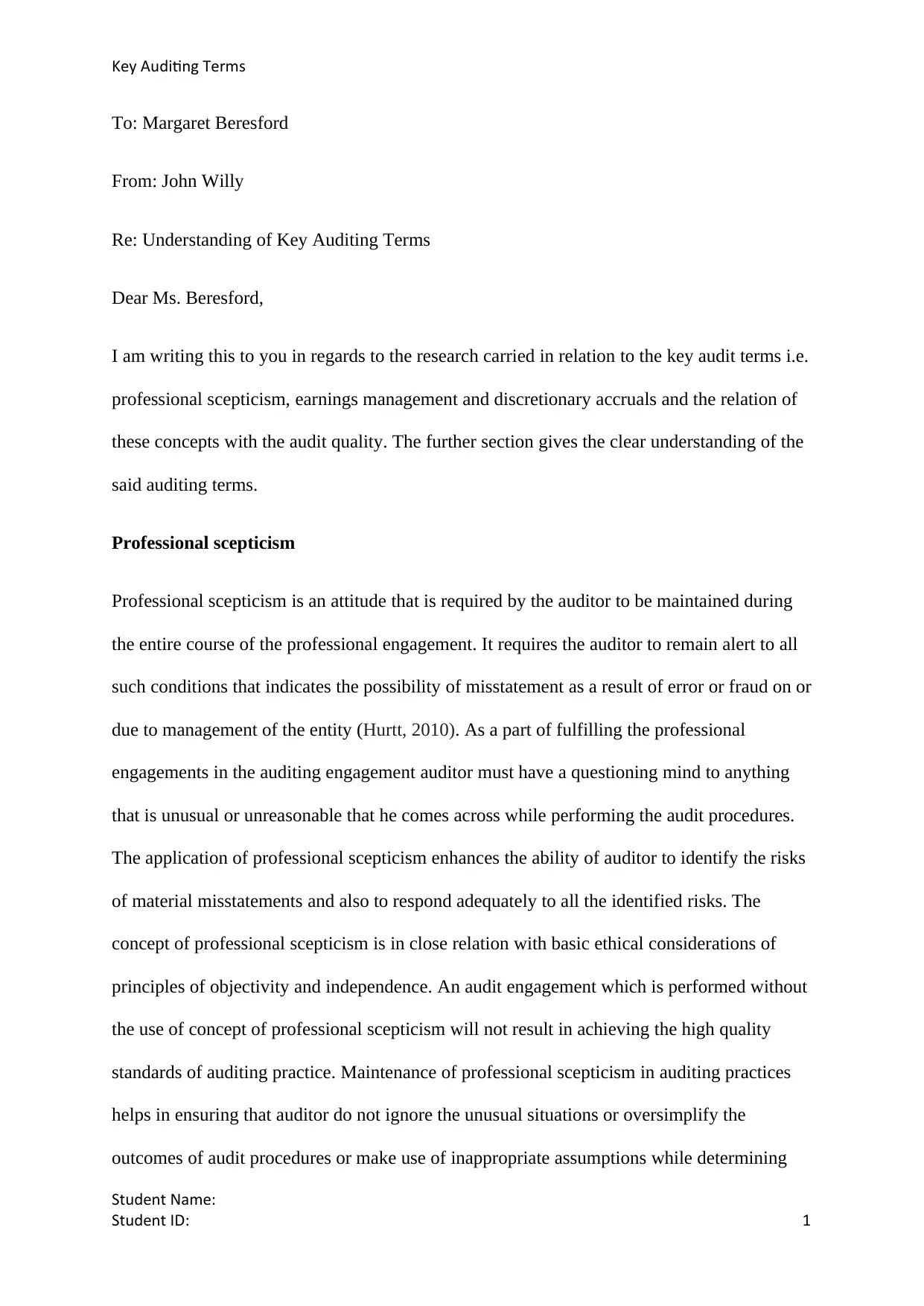
Key Auditing Terms
To: Margaret Beresford
From: John Willy
Re: Understanding of Key Auditing Terms
Dear Ms. Beresford,
I am writing this to you in regards to the research carried in relation to the key audit terms i.e.
professional scepticism, earnings management and discretionary accruals and the relation of
these concepts with the audit quality. The further section gives the clear understanding of the
said auditing terms.
Professional scepticism
Professional scepticism is an attitude that is required by the auditor to be maintained during
the entire course of the professional engagement. It requires the auditor to remain alert to all
such conditions that indicates the possibility of misstatement as a result of error or fraud on or
due to management of the entity (Hurtt, 2010). As a part of fulfilling the professional
engagements in the auditing engagement auditor must have a questioning mind to anything
that is unusual or unreasonable that he comes across while performing the audit procedures.
The application of professional scepticism enhances the ability of auditor to identify the risks
of material misstatements and also to respond adequately to all the identified risks. The
concept of professional scepticism is in close relation with basic ethical considerations of
principles of objectivity and independence. An audit engagement which is performed without
the use of concept of professional scepticism will not result in achieving the high quality
standards of auditing practice. Maintenance of professional scepticism in auditing practices
helps in ensuring that auditor do not ignore the unusual situations or oversimplify the
outcomes of audit procedures or make use of inappropriate assumptions while determining
Student Name:
Student ID: 1
To: Margaret Beresford
From: John Willy
Re: Understanding of Key Auditing Terms
Dear Ms. Beresford,
I am writing this to you in regards to the research carried in relation to the key audit terms i.e.
professional scepticism, earnings management and discretionary accruals and the relation of
these concepts with the audit quality. The further section gives the clear understanding of the
said auditing terms.
Professional scepticism
Professional scepticism is an attitude that is required by the auditor to be maintained during
the entire course of the professional engagement. It requires the auditor to remain alert to all
such conditions that indicates the possibility of misstatement as a result of error or fraud on or
due to management of the entity (Hurtt, 2010). As a part of fulfilling the professional
engagements in the auditing engagement auditor must have a questioning mind to anything
that is unusual or unreasonable that he comes across while performing the audit procedures.
The application of professional scepticism enhances the ability of auditor to identify the risks
of material misstatements and also to respond adequately to all the identified risks. The
concept of professional scepticism is in close relation with basic ethical considerations of
principles of objectivity and independence. An audit engagement which is performed without
the use of concept of professional scepticism will not result in achieving the high quality
standards of auditing practice. Maintenance of professional scepticism in auditing practices
helps in ensuring that auditor do not ignore the unusual situations or oversimplify the
outcomes of audit procedures or make use of inappropriate assumptions while determining
Student Name:
Student ID: 1
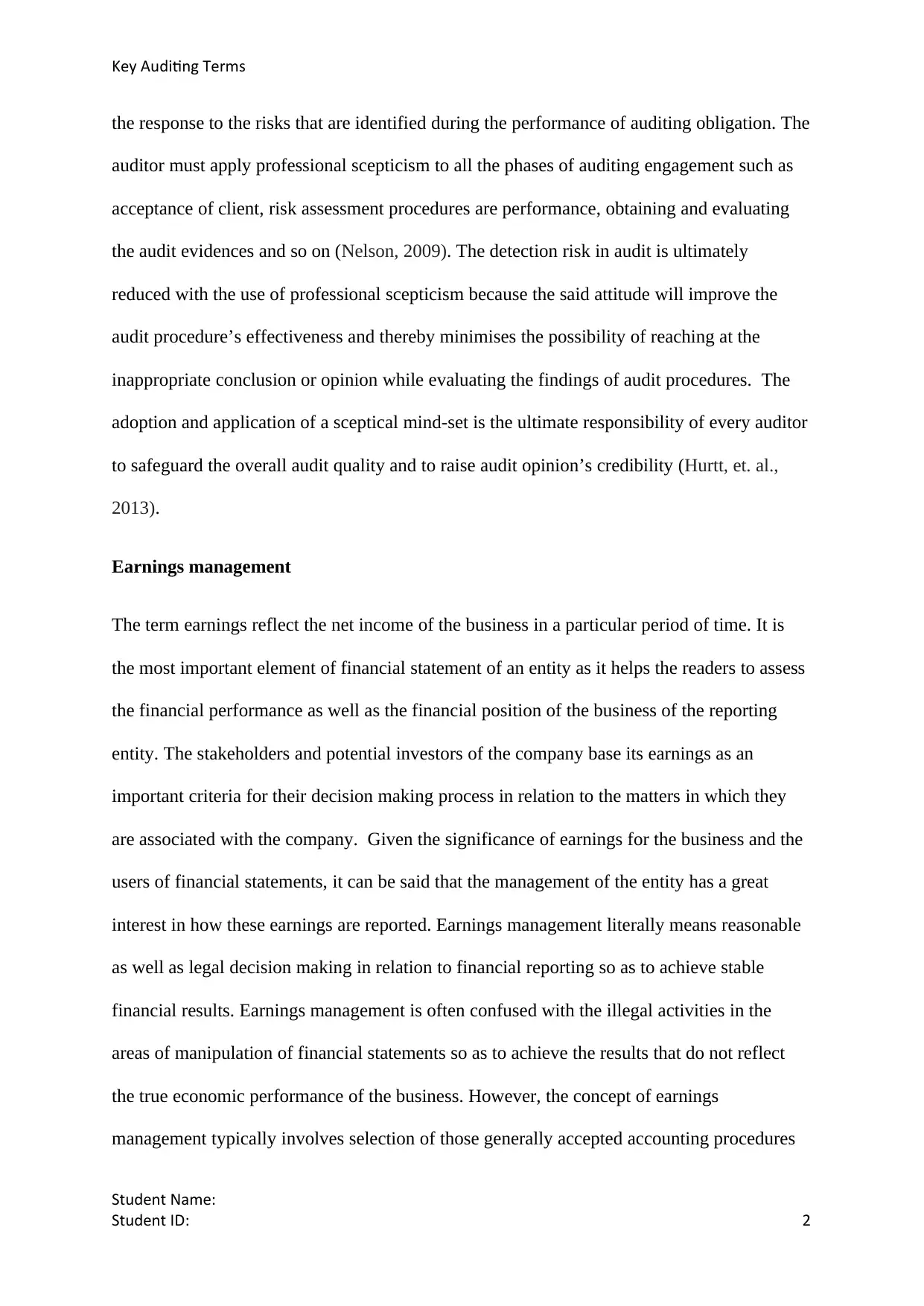
Key Auditing Terms
the response to the risks that are identified during the performance of auditing obligation. The
auditor must apply professional scepticism to all the phases of auditing engagement such as
acceptance of client, risk assessment procedures are performance, obtaining and evaluating
the audit evidences and so on (Nelson, 2009). The detection risk in audit is ultimately
reduced with the use of professional scepticism because the said attitude will improve the
audit procedure’s effectiveness and thereby minimises the possibility of reaching at the
inappropriate conclusion or opinion while evaluating the findings of audit procedures. The
adoption and application of a sceptical mind-set is the ultimate responsibility of every auditor
to safeguard the overall audit quality and to raise audit opinion’s credibility (Hurtt, et. al.,
2013).
Earnings management
The term earnings reflect the net income of the business in a particular period of time. It is
the most important element of financial statement of an entity as it helps the readers to assess
the financial performance as well as the financial position of the business of the reporting
entity. The stakeholders and potential investors of the company base its earnings as an
important criteria for their decision making process in relation to the matters in which they
are associated with the company. Given the significance of earnings for the business and the
users of financial statements, it can be said that the management of the entity has a great
interest in how these earnings are reported. Earnings management literally means reasonable
as well as legal decision making in relation to financial reporting so as to achieve stable
financial results. Earnings management is often confused with the illegal activities in the
areas of manipulation of financial statements so as to achieve the results that do not reflect
the true economic performance of the business. However, the concept of earnings
management typically involves selection of those generally accepted accounting procedures
Student Name:
Student ID: 2
the response to the risks that are identified during the performance of auditing obligation. The
auditor must apply professional scepticism to all the phases of auditing engagement such as
acceptance of client, risk assessment procedures are performance, obtaining and evaluating
the audit evidences and so on (Nelson, 2009). The detection risk in audit is ultimately
reduced with the use of professional scepticism because the said attitude will improve the
audit procedure’s effectiveness and thereby minimises the possibility of reaching at the
inappropriate conclusion or opinion while evaluating the findings of audit procedures. The
adoption and application of a sceptical mind-set is the ultimate responsibility of every auditor
to safeguard the overall audit quality and to raise audit opinion’s credibility (Hurtt, et. al.,
2013).
Earnings management
The term earnings reflect the net income of the business in a particular period of time. It is
the most important element of financial statement of an entity as it helps the readers to assess
the financial performance as well as the financial position of the business of the reporting
entity. The stakeholders and potential investors of the company base its earnings as an
important criteria for their decision making process in relation to the matters in which they
are associated with the company. Given the significance of earnings for the business and the
users of financial statements, it can be said that the management of the entity has a great
interest in how these earnings are reported. Earnings management literally means reasonable
as well as legal decision making in relation to financial reporting so as to achieve stable
financial results. Earnings management is often confused with the illegal activities in the
areas of manipulation of financial statements so as to achieve the results that do not reflect
the true economic performance of the business. However, the concept of earnings
management typically involves selection of those generally accepted accounting procedures
Student Name:
Student ID: 2
⊘ This is a preview!⊘
Do you want full access?
Subscribe today to unlock all pages.

Trusted by 1+ million students worldwide
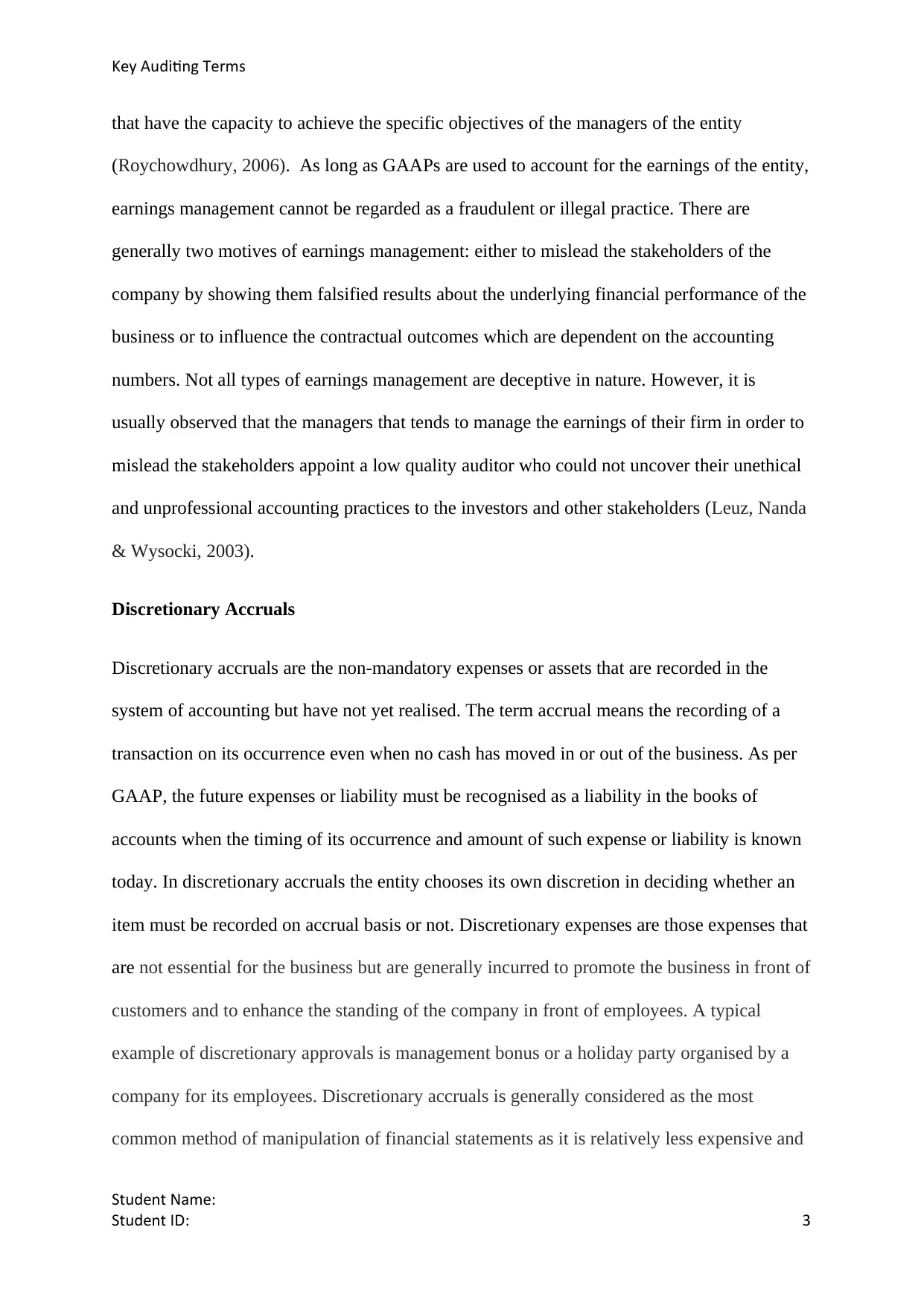
Key Auditing Terms
that have the capacity to achieve the specific objectives of the managers of the entity
(Roychowdhury, 2006). As long as GAAPs are used to account for the earnings of the entity,
earnings management cannot be regarded as a fraudulent or illegal practice. There are
generally two motives of earnings management: either to mislead the stakeholders of the
company by showing them falsified results about the underlying financial performance of the
business or to influence the contractual outcomes which are dependent on the accounting
numbers. Not all types of earnings management are deceptive in nature. However, it is
usually observed that the managers that tends to manage the earnings of their firm in order to
mislead the stakeholders appoint a low quality auditor who could not uncover their unethical
and unprofessional accounting practices to the investors and other stakeholders (Leuz, Nanda
& Wysocki, 2003).
Discretionary Accruals
Discretionary accruals are the non-mandatory expenses or assets that are recorded in the
system of accounting but have not yet realised. The term accrual means the recording of a
transaction on its occurrence even when no cash has moved in or out of the business. As per
GAAP, the future expenses or liability must be recognised as a liability in the books of
accounts when the timing of its occurrence and amount of such expense or liability is known
today. In discretionary accruals the entity chooses its own discretion in deciding whether an
item must be recorded on accrual basis or not. Discretionary expenses are those expenses that
are not essential for the business but are generally incurred to promote the business in front of
customers and to enhance the standing of the company in front of employees. A typical
example of discretionary approvals is management bonus or a holiday party organised by a
company for its employees. Discretionary accruals is generally considered as the most
common method of manipulation of financial statements as it is relatively less expensive and
Student Name:
Student ID: 3
that have the capacity to achieve the specific objectives of the managers of the entity
(Roychowdhury, 2006). As long as GAAPs are used to account for the earnings of the entity,
earnings management cannot be regarded as a fraudulent or illegal practice. There are
generally two motives of earnings management: either to mislead the stakeholders of the
company by showing them falsified results about the underlying financial performance of the
business or to influence the contractual outcomes which are dependent on the accounting
numbers. Not all types of earnings management are deceptive in nature. However, it is
usually observed that the managers that tends to manage the earnings of their firm in order to
mislead the stakeholders appoint a low quality auditor who could not uncover their unethical
and unprofessional accounting practices to the investors and other stakeholders (Leuz, Nanda
& Wysocki, 2003).
Discretionary Accruals
Discretionary accruals are the non-mandatory expenses or assets that are recorded in the
system of accounting but have not yet realised. The term accrual means the recording of a
transaction on its occurrence even when no cash has moved in or out of the business. As per
GAAP, the future expenses or liability must be recognised as a liability in the books of
accounts when the timing of its occurrence and amount of such expense or liability is known
today. In discretionary accruals the entity chooses its own discretion in deciding whether an
item must be recorded on accrual basis or not. Discretionary expenses are those expenses that
are not essential for the business but are generally incurred to promote the business in front of
customers and to enhance the standing of the company in front of employees. A typical
example of discretionary approvals is management bonus or a holiday party organised by a
company for its employees. Discretionary accruals is generally considered as the most
common method of manipulation of financial statements as it is relatively less expensive and
Student Name:
Student ID: 3
Paraphrase This Document
Need a fresh take? Get an instant paraphrase of this document with our AI Paraphraser
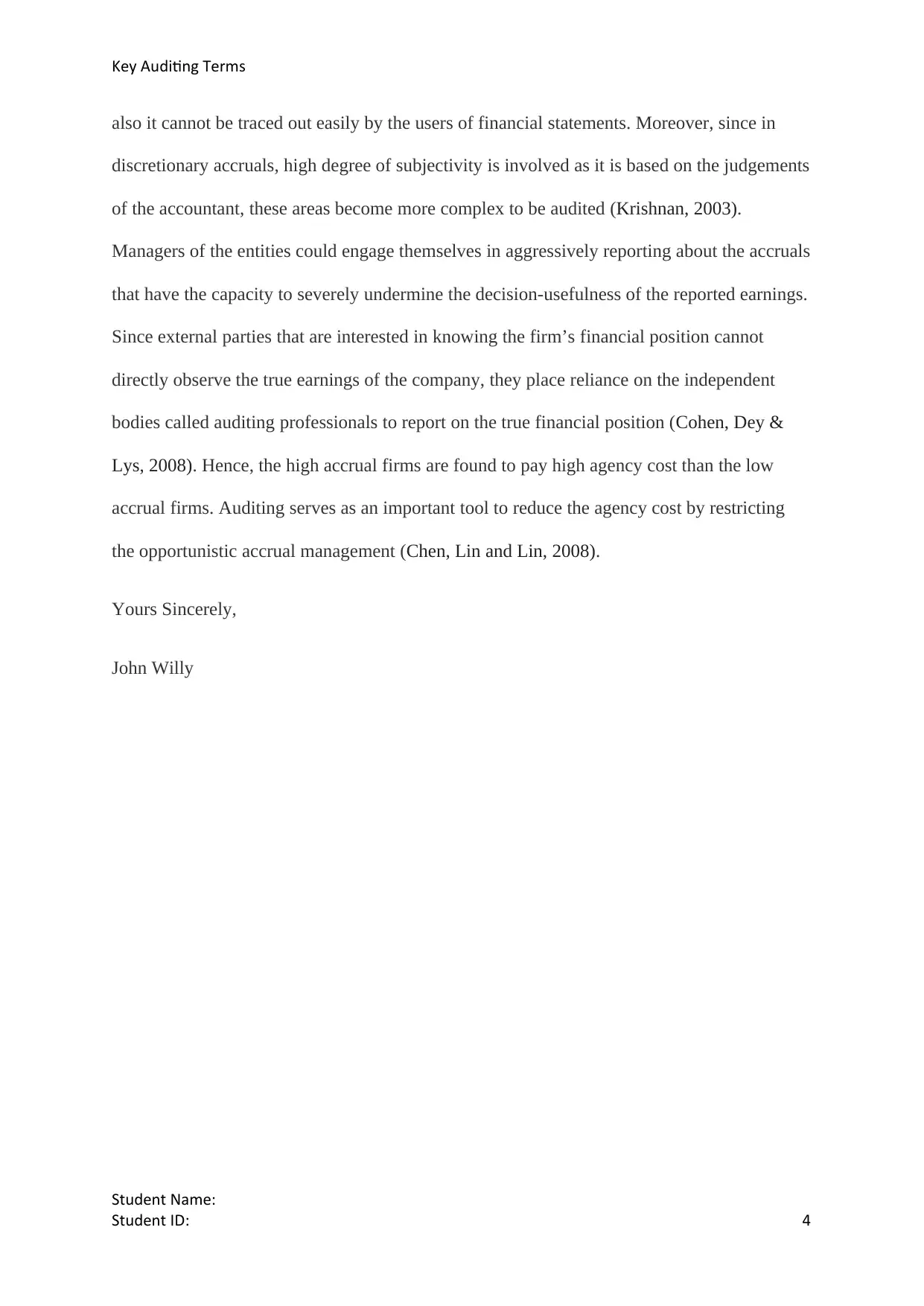
Key Auditing Terms
also it cannot be traced out easily by the users of financial statements. Moreover, since in
discretionary accruals, high degree of subjectivity is involved as it is based on the judgements
of the accountant, these areas become more complex to be audited (Krishnan, 2003).
Managers of the entities could engage themselves in aggressively reporting about the accruals
that have the capacity to severely undermine the decision-usefulness of the reported earnings.
Since external parties that are interested in knowing the firm’s financial position cannot
directly observe the true earnings of the company, they place reliance on the independent
bodies called auditing professionals to report on the true financial position (Cohen, Dey &
Lys, 2008). Hence, the high accrual firms are found to pay high agency cost than the low
accrual firms. Auditing serves as an important tool to reduce the agency cost by restricting
the opportunistic accrual management (Chen, Lin and Lin, 2008).
Yours Sincerely,
John Willy
Student Name:
Student ID: 4
also it cannot be traced out easily by the users of financial statements. Moreover, since in
discretionary accruals, high degree of subjectivity is involved as it is based on the judgements
of the accountant, these areas become more complex to be audited (Krishnan, 2003).
Managers of the entities could engage themselves in aggressively reporting about the accruals
that have the capacity to severely undermine the decision-usefulness of the reported earnings.
Since external parties that are interested in knowing the firm’s financial position cannot
directly observe the true earnings of the company, they place reliance on the independent
bodies called auditing professionals to report on the true financial position (Cohen, Dey &
Lys, 2008). Hence, the high accrual firms are found to pay high agency cost than the low
accrual firms. Auditing serves as an important tool to reduce the agency cost by restricting
the opportunistic accrual management (Chen, Lin and Lin, 2008).
Yours Sincerely,
John Willy
Student Name:
Student ID: 4
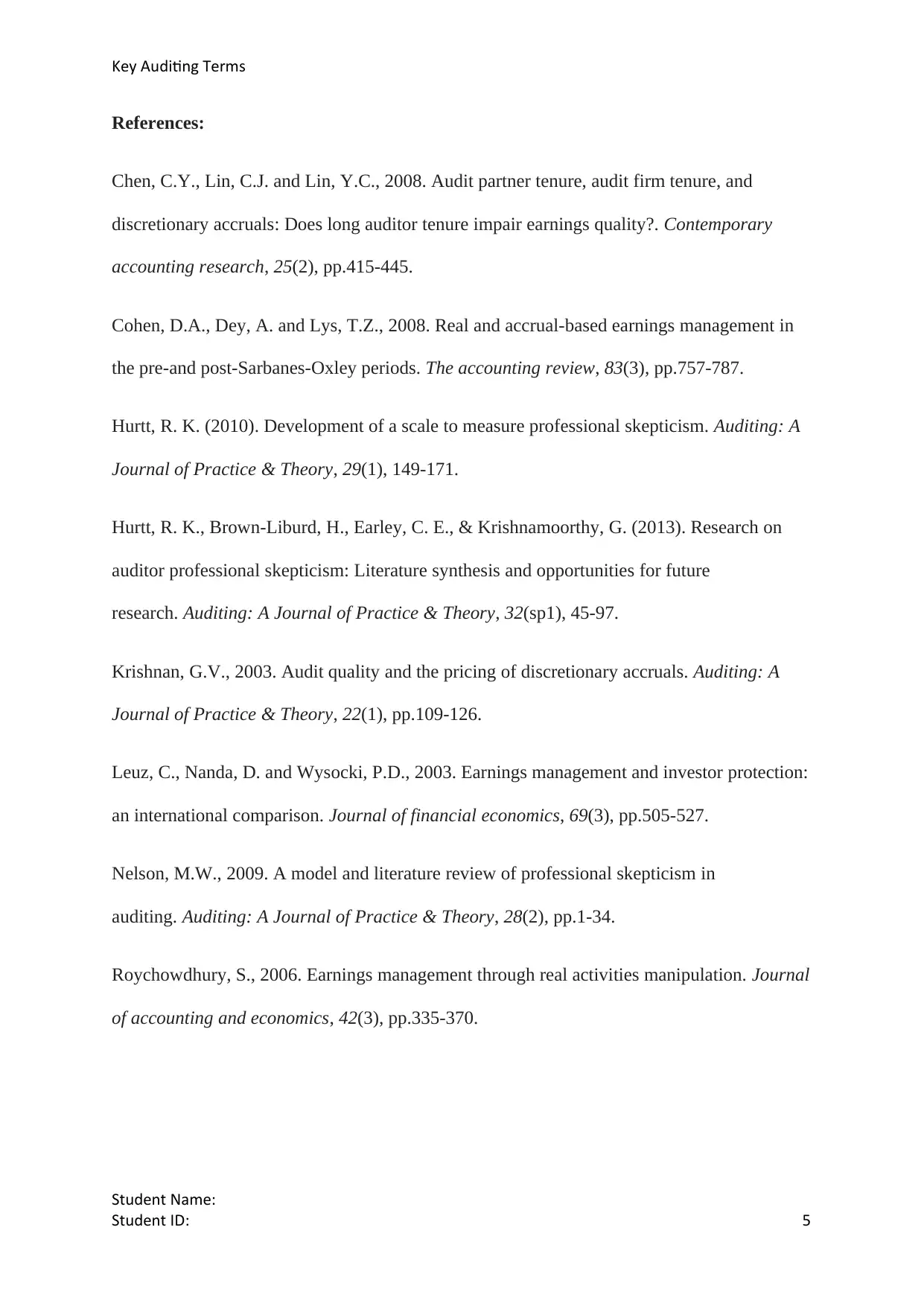
Key Auditing Terms
References:
Chen, C.Y., Lin, C.J. and Lin, Y.C., 2008. Audit partner tenure, audit firm tenure, and
discretionary accruals: Does long auditor tenure impair earnings quality?. Contemporary
accounting research, 25(2), pp.415-445.
Cohen, D.A., Dey, A. and Lys, T.Z., 2008. Real and accrual-based earnings management in
the pre-and post-Sarbanes-Oxley periods. The accounting review, 83(3), pp.757-787.
Hurtt, R. K. (2010). Development of a scale to measure professional skepticism. Auditing: A
Journal of Practice & Theory, 29(1), 149-171.
Hurtt, R. K., Brown-Liburd, H., Earley, C. E., & Krishnamoorthy, G. (2013). Research on
auditor professional skepticism: Literature synthesis and opportunities for future
research. Auditing: A Journal of Practice & Theory, 32(sp1), 45-97.
Krishnan, G.V., 2003. Audit quality and the pricing of discretionary accruals. Auditing: A
Journal of Practice & Theory, 22(1), pp.109-126.
Leuz, C., Nanda, D. and Wysocki, P.D., 2003. Earnings management and investor protection:
an international comparison. Journal of financial economics, 69(3), pp.505-527.
Nelson, M.W., 2009. A model and literature review of professional skepticism in
auditing. Auditing: A Journal of Practice & Theory, 28(2), pp.1-34.
Roychowdhury, S., 2006. Earnings management through real activities manipulation. Journal
of accounting and economics, 42(3), pp.335-370.
Student Name:
Student ID: 5
References:
Chen, C.Y., Lin, C.J. and Lin, Y.C., 2008. Audit partner tenure, audit firm tenure, and
discretionary accruals: Does long auditor tenure impair earnings quality?. Contemporary
accounting research, 25(2), pp.415-445.
Cohen, D.A., Dey, A. and Lys, T.Z., 2008. Real and accrual-based earnings management in
the pre-and post-Sarbanes-Oxley periods. The accounting review, 83(3), pp.757-787.
Hurtt, R. K. (2010). Development of a scale to measure professional skepticism. Auditing: A
Journal of Practice & Theory, 29(1), 149-171.
Hurtt, R. K., Brown-Liburd, H., Earley, C. E., & Krishnamoorthy, G. (2013). Research on
auditor professional skepticism: Literature synthesis and opportunities for future
research. Auditing: A Journal of Practice & Theory, 32(sp1), 45-97.
Krishnan, G.V., 2003. Audit quality and the pricing of discretionary accruals. Auditing: A
Journal of Practice & Theory, 22(1), pp.109-126.
Leuz, C., Nanda, D. and Wysocki, P.D., 2003. Earnings management and investor protection:
an international comparison. Journal of financial economics, 69(3), pp.505-527.
Nelson, M.W., 2009. A model and literature review of professional skepticism in
auditing. Auditing: A Journal of Practice & Theory, 28(2), pp.1-34.
Roychowdhury, S., 2006. Earnings management through real activities manipulation. Journal
of accounting and economics, 42(3), pp.335-370.
Student Name:
Student ID: 5
⊘ This is a preview!⊘
Do you want full access?
Subscribe today to unlock all pages.

Trusted by 1+ million students worldwide
1 out of 6
Related Documents
Your All-in-One AI-Powered Toolkit for Academic Success.
+13062052269
info@desklib.com
Available 24*7 on WhatsApp / Email
![[object Object]](/_next/static/media/star-bottom.7253800d.svg)
Unlock your academic potential
Copyright © 2020–2026 A2Z Services. All Rights Reserved. Developed and managed by ZUCOL.





